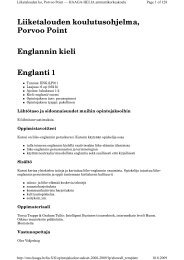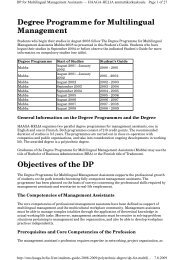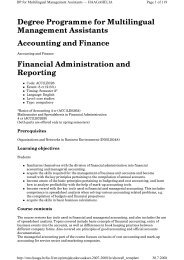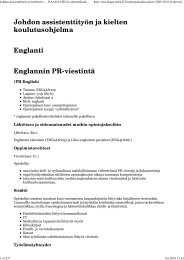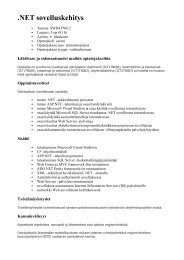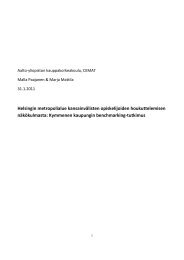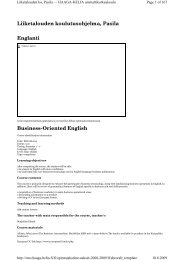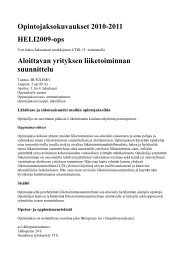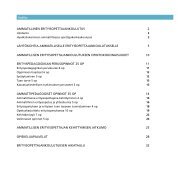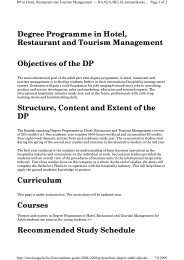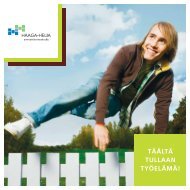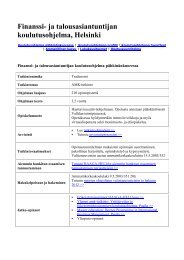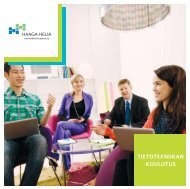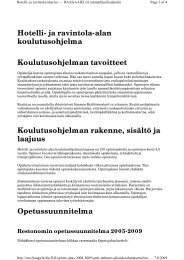Curriculum 2010-2011 - HAAGA-HELIA ammattikorkeakoulu
Curriculum 2010-2011 - HAAGA-HELIA ammattikorkeakoulu
Curriculum 2010-2011 - HAAGA-HELIA ammattikorkeakoulu
You also want an ePaper? Increase the reach of your titles
YUMPU automatically turns print PDFs into web optimized ePapers that Google loves.
Contents<br />
Getting started 2<br />
Continuous Development and the Vocational Teacher 2<br />
The Structure of the Program in Vocational Teacher<br />
Education 3<br />
The Principles of Guidance Counseling and<br />
Collaboration 3<br />
Team Activity 3<br />
Distance and Online Study 4<br />
Contact Days 4<br />
Attendance and Absences in Contact Days 4<br />
International Exchange 4<br />
Credit Transfer in the School of Vocational Teacher<br />
Education 4<br />
Pedagogical Studies 5<br />
Plagiarism 7<br />
Developing and Assessing Competence 7<br />
Competence Areas for Vocational<br />
Teachers 9<br />
Guidance Counseling Competence 10<br />
Organizational and Networking Competence 11<br />
Research and Development Competence 12<br />
PEDAGOGICAL STUDIES IN THE VOCATIONAL<br />
TEACHER EDUCATION PROGRAM 13<br />
Basic Studies in Pedagogy (25 cr) 15<br />
ED1 Introduction to Pedagogy 16<br />
ED2 Teaching and Learning 16<br />
ED3 Learning at Work 16<br />
ED4 Toward a Research-Oriented Approach 16<br />
Studies in Vocational Pedagogy (35 cr) 17<br />
1. Identifying Competence and the Development Plan 18<br />
2. The Vocational Teacher as a Guidance Counselor;<br />
Teaching Practice 22<br />
3. The Organizations and Networks of the Vocational<br />
Teacher 27<br />
4. Researching and Developing Vocational Education 30<br />
The Developmental Continuum of<br />
the Vocational Teacher 33<br />
Continuing Education 33<br />
Research and Development 33<br />
Alumni Activity 34<br />
Frameworks of Vocational Teacher<br />
Education 35<br />
The Fields of Activity of the Vocational Teacher 35<br />
The Choices of Vocational Teacher Education and<br />
the Fields of Activity 35<br />
The History of <strong>HAAGA</strong>-<strong>HELIA</strong> School of Vocational<br />
Teacher Education 37<br />
Student Services 38<br />
SCHEDULE 42<br />
1
Getting started<br />
This is the study guide of <strong>HAAGA</strong>-<strong>HELIA</strong> School of Vocational<br />
Teacher Education. The guide contains the curriculum<br />
that covers 60 credit points of pedagogical studies,<br />
learning assignments as well as information on how<br />
studies proceed and other important matters<br />
concerning learning.<br />
The studies include development of one’s work environment,<br />
completing assignments, teamwork, distance<br />
and online study, reading literature on pedagogy and<br />
attending contact days.<br />
The frameworks, choices and backgrounds of the vocational<br />
teacher education are described in the chapter<br />
titled “Frameworks of Vocational Teacher Education.”<br />
Continuous Development and the Vocational Teacher<br />
haaga-helia School of Vocational Teacher Education is<br />
founded on the belief that teaching is continuous development<br />
of one’s competences and work environment.<br />
Perhaps you are entering the vocational teacher education<br />
program as a new teacher or with many years of experience.<br />
Maybe you have not taught at all or you conduct<br />
training within a company. The participants in the<br />
teacher education program not only bring along teaching<br />
experience, but also many kinds of work experience,<br />
as well as competences and expertise from different fields.<br />
As a result of the different backgrounds of the participants,<br />
the vocational teacher education studies take on a<br />
slightly different path for each individual.<br />
It might be the case that you have clear wishes with<br />
regard to your studies, which have become apparent to<br />
you in your teaching, and which you wish to investigate<br />
further. On the other hand, you can begin studies with<br />
an open mind to search for your teacher identity. In the<br />
beginning of the studies, together we will look at which<br />
matters are important for you and your workplace and<br />
what you wish to develop during your studies. This inquiry<br />
will form the basis of your personal development<br />
plan or pdp. With the aid of assignments and the pdp,<br />
each participant’s study path is customized both in terms<br />
of content and activity.<br />
2
In order to develop work and learning, students will<br />
become familiar with the approach and methods of developmental<br />
research. In their developmental projects,<br />
students are expected to research and develop their own<br />
work in relation to vocational education and the demands<br />
of the employment sector.<br />
The Structure of the Program in Vocational<br />
Teacher Education (60 cr)<br />
The pedagogical studies consist of the basic studies in<br />
pedagogy (25 cr) and studies in vocational pedagogy (35<br />
cr), which includes teaching practice.<br />
Studies taught in English can be completed in 1½<br />
years. The basic studies in pedagogy are to be completed<br />
alongside studies in vocational pedagogy.<br />
The Principles of Guidance Counseling<br />
and Collaboration<br />
When the pedagogical studies begin, students will be divided<br />
into teams of 4-6 members. Team formation is determined<br />
on the basis of such factors as a common workplace,<br />
the same teaching field or level, the same residential<br />
area or a common area of interest such as:<br />
n Guidance counseling competence<br />
n Organizational and networking competence<br />
n Research and development competence<br />
n Pedagogy for entrepreneurs<br />
n Multiculturalism<br />
n Special needs learner<br />
n The teacher’s authority and ethics<br />
n Creative practices<br />
The team plans, implements and assesses its learning together<br />
as well as guides the progress of its members’ studies.<br />
The team has relative freedom to organize its studies<br />
and internal collaboration. In order to strengthen its activity,<br />
the team is to complete its own development plan,<br />
known as a Team Development Plan (tdp).<br />
Every student and team will be assigned a guidance<br />
counselor from the teaching staff at haaga-helia aokk<br />
(Ammatillinen opettajakorkeakoulu = School of Vocational<br />
Teacher Education). If you have questions concerning<br />
studies or your studies get delayed or interrupted,<br />
always first contact your guidance counselor. The purpose<br />
of the guidance counselor and the team is to support<br />
your studies, and in this manner, also the development of<br />
your work environment. However, completion of studies<br />
in accordance with the Personal Development Plan (pdp)<br />
is ultimately your responsibility.<br />
During studies, you will be studying in different teams<br />
with English- and Finnish-speaking teacher students.<br />
When completing assignments, you are also working in<br />
collaboration with your workplace. In addition, you have<br />
the possibility to take part in r&d activity at haaga-helia<br />
School of Vocational Teacher Education.<br />
Team Activity<br />
In practice, the aim of the team is:<br />
n to inspire and encourage learning<br />
n to make its own Team Development Plan (tdp)<br />
n to support its members in the progress of their studies<br />
n to complete assignments together (where applicable)<br />
n to observe teaching and counseling situations of its<br />
members<br />
n to participate in the teaching practice of its members<br />
and in the planning, implementation and assessment<br />
of each other’s developmental projects<br />
3
The team can also decide to conduct a joint developmental<br />
project.<br />
Distance and Online Study<br />
In between contact days, students work in their own<br />
workplaces. The online learning platform is used for<br />
working on assignments as well as for sharing and developing<br />
different matters and perspectives related to the<br />
teacher’s work. Part of the learning materials, instructions<br />
and feedback is available online.<br />
In addition to developing the content of studies, the<br />
purpose of online study is to develop general internet<br />
skills, such as learning to technically command at least<br />
one online platform, to improve virtual communication<br />
skills and interacting in an expert network.<br />
Contact Days<br />
In the contact days for studies in vocational pedagogy,<br />
students, guidance counselors and other experts act as<br />
an r&d community. The contact days are forums of vocational<br />
competence, in which the development of students’<br />
workplaces and their related innovations is addressed<br />
with the aid of assignments. Additionally, expert<br />
lectures may cover topics such as education policy and<br />
education systems, the relation between education and<br />
work, curricula and the planning of teaching, guidance<br />
counseling and assessment as well as the guidance of special<br />
needs groups.<br />
Attendance and Absences in Contact Days<br />
For acceptable completion of the pedagogical studies, the<br />
student must be present and actively take part in contact<br />
days marked in the schedule.<br />
If the student must be absent for part or all of a contact<br />
session, he/she is to report the absence in advance<br />
to both the guidance counselor as well as his/her own<br />
team. Together with the guidance counselor and team,<br />
it is to be agreed as to how the absence can be compensated<br />
through earlier completion of work so that it benefits<br />
the whole group and covers the topics outlined in<br />
the curriculum. If the student has absences amounting to<br />
more than 3 days in the 1.5 year period of study, the student<br />
is to meet with his/her guidance counselor to discuss<br />
whether the student should transfer to a starting group in<br />
the next semester or to discuss what are the student’s resources<br />
and possibilities to continue studies according to<br />
the schedule of his/her original group.<br />
International Exchange<br />
Students have the opportunity to complete part of their<br />
vocational teacher education studies in an international<br />
exchange. The exchange can be part of either the School<br />
of Vocational Teacher Education, one’s own educational<br />
institute or an exchange the student has personally arranged.<br />
The exchange is to be agreed according to the<br />
Personal Development Plan (pdp) and with the Director<br />
of the School of Vocational Teacher Education on the basis<br />
of an application.<br />
Credit Transfer in the School of<br />
Vocational Teacher Education<br />
Competence acquired earlier or elsewhere through studies<br />
and work experience can be converted into credits toward<br />
the degree in the School of Vocational Teacher Education.<br />
The forms of conversion are substitution, inclusion<br />
and accreditation of prior learning.<br />
Substitution means that studies in the degree at the<br />
4
School of Vocational Teacher Education can be replaced<br />
by studies completed elsewhere that are in the same field<br />
of study and similar in content. Inclusion means that<br />
studies completed elsewhere are included in the studies of<br />
the degree at the School of Vocational Teacher Education.<br />
The basis for recognizing prior learning is the competence<br />
objectives of the curriculum and the competence<br />
areas of the vocational teacher stated therein. The process<br />
of credit transfer at the School of Vocational Teacher Education<br />
is presented in the following figure.<br />
Competence can be acquired everywhere, anytime and<br />
in numerous ways. The essential point in the assessment of<br />
competence is its relevance with regard to the competence<br />
areas of the vocational teacher. The student is to assess, describe<br />
and display his/her competence in conjunction with<br />
the PDP discussion and the guidance process in an agreed<br />
manner. On the basis of the material presented by the student,<br />
the guidance counselor assesses the student’s competence<br />
and decides upon how it will be accredited.<br />
Inclusion is based on studies completed or to be completed<br />
elsewhere that have been agreed with the guidance<br />
counselor in the PDP discussion. These studies are included<br />
as part of the teacher degree studies. The studies<br />
can be as follows:<br />
n Studies offered in the Further Education Program in<br />
the School of Vocational Teacher Education<br />
n Studies offered in other schools of vocational teacher<br />
education<br />
n Vocational pedagogy studies offered in other institutions<br />
of higher education<br />
n Discuss with your guidance counselor about including<br />
these studies in your degree. A suitable amount of<br />
credits is approximately 5 study points.<br />
Pedagogical Studies<br />
The student that has earlier completed university-level basic<br />
studies in pedagogy in Finland (25 cr/15 cr) can transfer<br />
these studies to cover the teacher pedagogical studies.<br />
In the event that the pedagogical studies (cf. date of completion)<br />
are more than 10 years old at the start of studies<br />
on May 19, 2009, the student is to complete a supplementary<br />
assignment in pedagogy, which can be found on<br />
the student pages:<br />
www.haaga-helia.fi/en/vocational-teacher-education<br />
In the event that the basic studies in pedagogy were<br />
completed after May 19, 1999 and there is an attached<br />
transcript of the studies in the application form, the student<br />
does not have to separately apply for credit transfer.<br />
The module will automatically be transferred to the student’s<br />
study transcript in the study affairs office.<br />
The following basic studies in pedagogy are accepted for<br />
credit transfer (25 cr/15 cr):<br />
n Basic studies in pedagogy<br />
n Basic studies in adult pedagogy<br />
n Basic studies in special needs pedagogy<br />
n Basic studies in vocational pedagogy<br />
The student can also apply for credit transfer for studies<br />
in pedagogy that amount to less than 25 cr/15 cr. In such<br />
cases, the student should fill out a credit transfer form<br />
with the completed studies and return it to the Study Affairs<br />
Office. The credit transfer form is available on the<br />
student pages. Regulations concerning credit transfer are<br />
in accordance with the recommendations of the Faculty<br />
of Education at the University of Helsinki. The teacher<br />
teaching the subject in question makes the credit transfer<br />
decision.<br />
5
Figure of the Process of Credit Transfer at the School of Vocational Teacher Education<br />
Recognition<br />
n Applies to studies that fulfill requirements for<br />
competence areas<br />
Inclusion<br />
n Studies completed or currently being completed<br />
elsewhere that are included as part<br />
n Applies to studies that fulfill requirements for<br />
competence areas<br />
Substitution<br />
n The student applies for the substitution of<br />
core modules of pedagogical studies with<br />
similar studies<br />
n Studies other than pedagogical studies can<br />
be substituted<br />
The student describes and displays his/her<br />
competence to the guidance counselor<br />
In the PDP discussion, the student agrees with<br />
the guidance counselor about the inclusion of<br />
other studies<br />
The student submits the Credit Transfer<br />
Application to the Study Affairs Office<br />
The guidance counselor assesses the student’s<br />
competence and decides upon how it will be<br />
accredited<br />
The guidance counselor records the credit transfer in the study register.<br />
The decision to grant credit transfer is recorded in the study register in<br />
the Study Affairs Office<br />
6
The student who is dissatisfied with the decision concerning<br />
credit transfer can apply for rectification of the<br />
decision in accordance with the degree regulations concerning<br />
The School of Vocational Teacher Education.<br />
Plagiarism<br />
Plagiarism is a punishable offence. The consequences of<br />
plagiarism (e.g., copying another person’s work, direct<br />
copying of another person’s work without appropriate<br />
mention of the author, or other similar forms of plagiarism)<br />
are failure of the test or assignment, a warning from<br />
the Rector or a period of suspension, which is decided by<br />
the Board of the University of Applied Sciences (Decree<br />
28, University of Applied Sciences). The module in question<br />
will be marked as failed and the student must retake<br />
the module from the beginning. Plagiarism is marked in<br />
the student’s grade transcript.<br />
University of Applied Sciences Law 351/2003, Decree 6 § 28:<br />
The student, who is found guilty of plagiarism or has otherwise<br />
broken rules in the University of Applied Sciences, can<br />
be subject to disciplinary measures, depending on the severity<br />
of the infringement, in the form of a warning or suspension<br />
for a set period of time, up to one year. Before resolution<br />
of the matter, the student will be given an opportunity to be<br />
heard on his/her side of the matter. The warning is decided<br />
by the Rector and the Board of the University of Applied Sciences<br />
determines the suspension period of the student.<br />
Developing and Assessing Competence<br />
The pedagogical studies are designed to aid in personal development<br />
and growth. The starting point is vocational<br />
teacher competence, which includes knowledge, skills and<br />
attitudes (cf. earlier chapter). On this basis, together with<br />
a guidance counselor, the student draws up a personal development<br />
plan (pdp), whose implementation will be followed<br />
and assessed in guidance counseling discussions.<br />
haaga-helia School of Vocational Teacher Education<br />
employs the principle of developmental assessment, which<br />
means that activity is assessed, developed and guided simultaneously.<br />
Independent study, learning in teams and<br />
on the job, and the competences gained from them are<br />
the topics covered in the ongoing discussion and assessment.<br />
The starting points in a discussion are the competence<br />
areas for a vocational teacher, the personal goals set<br />
by the student and the studies that support them.<br />
Assessment information is produced through individual<br />
and team self-assessment as well as through documenting<br />
one’s own learning from various perspectives.<br />
Self-assessment is focused on one’s own or one’s team activity,<br />
its objectives, its preconditions for activity and outcomes.<br />
In team peer assessment, members receive guidance<br />
through the comments and feedback of others. With<br />
the aid of the team, common understanding of the work<br />
teachers do is deepened and developed.<br />
One’s own learning is made transparent by compiling<br />
assessment information into a developmental portfolio.<br />
The developmental portfolio is a multifaceted tool for the<br />
research of learning, development and growth. The developmental<br />
portfolio is compiled by producing and collecting<br />
assessment information, then selecting and organizing<br />
it. The developmental portfolio describes one’s current<br />
level of competence.<br />
Additional objects of developmental assessment are<br />
the entire teacher education program and the educational<br />
environment and networks. The School of Vocational<br />
Teacher Education gathers assessment information from<br />
students with the so-called Arttuli questionnaire. Together<br />
students and teachers interpret the findings of the Arttuli<br />
questionnaire.<br />
7
The modules 1–4 (see next chapter), which are part of<br />
the studies in vocational pedagogy, are assessed both verbally<br />
and as either a pass or incomplete.<br />
The student who is dissatisfied with the assessment<br />
concerning studies can apply for rectification of the assessment<br />
in accordance with the degree regulations concerning<br />
The School of Vocational Teacher Education.<br />
In the following, the vocational pedagogy competence<br />
areas are defined in relation to the work environment of<br />
the vocational teacher as well as operating modes and<br />
processes.<br />
8
Competence Areas for Vocational Teachers<br />
The activity of the vocational teacher is based on<br />
command of the profession and the work as well<br />
as competence of vocational pedagogy (Figure 1).<br />
Competence of vocational pedagogy is divided into<br />
three areas:<br />
n Guidance counseling competence<br />
n Organizational and networking competence<br />
n Research and development competence<br />
profession and work related competence<br />
Guidance counseling<br />
competence<br />
Organizational and<br />
networking competence<br />
Research and development competence<br />
Figure 1. The Foundations of Activity for the Vocational Teacher<br />
9
Competence Areas for Vocational Teachers – GUIDANCE COUNSELING COMPETENCE<br />
Areas for<br />
competence<br />
assessment<br />
Criteria for competence assessment<br />
My<br />
personal<br />
goals<br />
Learning<br />
activities<br />
Counseling in support<br />
of vocational processes.<br />
Has command of various<br />
counseling forms that<br />
support vocational<br />
development processes.<br />
Utilizes various counseling<br />
forms that support vocational<br />
development processes.<br />
Can assess and develop<br />
various counseling forms<br />
and basic principles that<br />
support vocational processes<br />
in diverse contexts.<br />
Diversity in learning.<br />
Can recognize and appreciate<br />
diversity in learning.<br />
Takes diversity in learning<br />
into account in work.<br />
Takes diversity in learning<br />
into account and offers<br />
support when difficulties<br />
arise.<br />
The basic principles of<br />
development processes<br />
for vocational competence.<br />
Basics of individual<br />
and group dynamics.<br />
Understands the basic<br />
principles of development<br />
processes for vocational<br />
competence. Understands<br />
the basics of individual and<br />
group dynamics.<br />
Utilizes in work both the<br />
development processes for<br />
vocational competence and<br />
individual and group<br />
dynamics.<br />
Can assess and develop<br />
different development<br />
processes for vocational<br />
competence as well as<br />
individual and group<br />
dynamics.<br />
Counseling and teaching,<br />
individual and group<br />
counseling.<br />
Understands the differences<br />
and commonalities between<br />
counseling and teaching,<br />
has command of different<br />
group counseling/teaching<br />
methods.<br />
Can plan and implement<br />
different methods for<br />
individual and group<br />
counseling and teaching<br />
in various contexts.<br />
Can plan, assess and develop<br />
new methods for individual<br />
and group counseling and<br />
teaching.<br />
Interpersonal<br />
communication skills,<br />
dialogue.<br />
Recognizes own interpersonal<br />
communication<br />
skills with students, has<br />
knowledge of different<br />
forms of interpersonal<br />
communication and recognizes<br />
dialogue as an effective<br />
means of communication<br />
in counseling.<br />
Utilizes different forms<br />
of interpersonal communication<br />
and dialogue in<br />
different counseling situations.<br />
Develops new and different<br />
forms of interpersonal communication<br />
and dialogue in<br />
counseling situations.<br />
10
Competence Areas for Vocational Teachers – ORGANIZATIONAL AND NETWORKING COMPETENCE<br />
Areas for competence<br />
assessment<br />
Criteria for competence assessment<br />
My<br />
personal<br />
goals<br />
Learning<br />
activities<br />
Knowledge of the organization’s<br />
objectives,<br />
participation in the organization’s<br />
operations<br />
and development<br />
Has knowledge of the organi zation’s<br />
basic structures and objectives as<br />
well as participating in its operations<br />
and development through<br />
one’s own immediate work community.<br />
Has knowledge of the<br />
organization’s basic<br />
structures and objectives<br />
as well as participating<br />
in its operations and<br />
development.<br />
Is able to recognize<br />
one’s own organization<br />
as part of the vocational<br />
education system, participating<br />
in the development<br />
of objectives and activities<br />
of vocational education.<br />
Maintaining develop <br />
mental networks with<br />
various actors for work<br />
life and vocational competence<br />
Knows the basic principles of network-based<br />
development of vocational<br />
competence and participates<br />
in some networking activity. Has<br />
knowledge of the vocational education<br />
system and its contacts with<br />
work life. Is familiar with the current<br />
discussion on development in his/<br />
her field.<br />
Maintains and develops<br />
developmental networks<br />
for vocational competence<br />
with various actors.<br />
Builds work life relationships<br />
within vocational<br />
education and participates<br />
in the current discussion<br />
on development<br />
in his/her field.<br />
Builds, develops and<br />
maintains developmental<br />
networks for vocational<br />
competence. Develops<br />
new ways of operating<br />
in work life networks<br />
for vocational education.<br />
Builds forums for interpreting<br />
and developing<br />
one’s own field.<br />
Results-oriented colla <br />
boration with students,<br />
colleagues and various<br />
vocational groups<br />
Participates in collaborative planning<br />
of objectives and has knowledge<br />
of their theoretical bases. Participates<br />
in collaborative networks<br />
in his/her own field and educational<br />
program.<br />
Participates in the planning<br />
of collaboration in<br />
the work organization,<br />
applying the theoretical<br />
principles of collaboration.<br />
Participates in collaborative<br />
networks in<br />
his/her own field and develops<br />
them.<br />
Guides collaborative<br />
situations in his/her<br />
organization and develops<br />
collaboration further.<br />
Builds new collaborative<br />
networks for his/her own<br />
field and education program<br />
with various actors.<br />
Responsible activity, respecting<br />
different cultures<br />
and human dignity<br />
Has knowledge of the legal regulations<br />
prescribing his/her activity<br />
and acts in accordance. Is aware<br />
of multiculturalism and respects it.<br />
Knows the principles of sustainable<br />
development and promotes them.<br />
Participates in the ongoing<br />
discussion on the<br />
development of legal<br />
regulation. Participates<br />
in activities that promote<br />
multiculturalism.<br />
Develops his/her organization<br />
to be responsible<br />
and respectful of different<br />
cultures and human<br />
dignity.<br />
11
Competence Areas for Vocational Teachers – RESEARCH AND DEVELOPMENT COMPETENCE<br />
Areas for<br />
competence<br />
assessment<br />
Criteria for competence assessment<br />
My<br />
personal<br />
goals<br />
Learning<br />
activities<br />
Research and<br />
development<br />
orientation<br />
Concentrates on locating both<br />
opportunities and problems in<br />
one’s own work, researches<br />
theoretical and practical ways<br />
of operating and produces<br />
solutions, evaluating their<br />
feasibility, effectiveness and<br />
desirability.<br />
Is actively identifying areas<br />
for research and development<br />
in his/her own work<br />
organization as well as producing<br />
solutions for others<br />
to evaluate.<br />
Critically recognizes and<br />
produces solutions through<br />
a research and development<br />
orientation in purposefully<br />
chosen strategic networks.<br />
Following the development<br />
of a vocational<br />
field and predicting<br />
educational needs<br />
Has knowledge of the most important<br />
discussions in his/her<br />
field and participates in the ongoing<br />
discussion.<br />
Is involved in development<br />
in networks that anticipate<br />
the development needs in<br />
his/her vocational field.<br />
Integrates into his/her work<br />
the most important development<br />
challenges in his/her<br />
field and is involved in collaboratively<br />
producing solutions<br />
with other actors in<br />
the field.<br />
Knowledge of development-oriented<br />
research methods<br />
and application of<br />
them in one´s own<br />
work, vocational<br />
field and education<br />
program.<br />
Knows the tools of development-oriented<br />
research, particularly<br />
for the development of<br />
one’s own field.<br />
Utilizes the tools for development-oriented<br />
research<br />
and develops the operations<br />
of one’s own work organization<br />
with them. Knows how<br />
to realistically evaluate the<br />
effectiveness of the solutions<br />
produced.<br />
Critically applies development-oriented<br />
tools with<br />
background knowledge of<br />
methods and promotes the<br />
development of his/her own<br />
work organization and field<br />
of education. Produces contextually<br />
appropriate development<br />
concepts and shares<br />
them in different forums.<br />
Working habits in<br />
project-based work<br />
Knows how to analyze his/her<br />
own activity according to the<br />
basic principles of project management<br />
(planning, objectives,<br />
timetable, approaches, resources<br />
and evaluation) and promotes<br />
multi-voice and multiform<br />
documentation in the<br />
project.<br />
Critically applies the tools<br />
resulting from the project<br />
work and writing as well as<br />
identifies the areas of development<br />
in project-based<br />
work.<br />
Knows how to choose, from<br />
among the tools produced<br />
in a project, those tools that<br />
support the development of<br />
his/her organization and can<br />
adapt them to his/her own<br />
needs.<br />
Student counseling<br />
in development tasks<br />
in vocational fields<br />
12<br />
Knows different tools for counseling.<br />
Knows how to select different<br />
operative models for<br />
counseling situations.<br />
Makes use of a counseling<br />
orientation with different<br />
tools in different organizational<br />
settings in which different<br />
development tasks<br />
are advanced.
PEDAGOGICAL STUDIES IN THE VOCATIONAL TEACHER EDUCATION PROGRAM<br />
Learning Assignments:<br />
Basic Studies in Pedagogy 25 cr<br />
ED 1 Introduction to Pedagogy<br />
ED 2 Teaching and Learning<br />
ED 3 Learning at Work<br />
ED 4 Toward a Research-Oriented Approach<br />
Studies in Vocational Pedagogy 35 cr<br />
1. Identifying Competence and the Development Plan 6 cr<br />
Learning Assignment Block<br />
1A The <strong>Curriculum</strong> as a Starting Point for a Research and<br />
Development Orientation toward Work<br />
1B Identifying and Analyzing One´s Own Competences<br />
1C Identifying the Competence and Development Needs<br />
of One’s Workplace<br />
1D PDP and TDP: Personal and Team Development Plans<br />
2. The Vocational Teacher as a Guidance Counselor,<br />
Teaching Practice 12 cr<br />
Learning Assignment Block<br />
2A Plan for a Teaching and Guidance Counseling<br />
Thematic Unit<br />
2B Implementation and Assessment of a Teaching and<br />
Guidance Counseling Thematic Unit<br />
2C Follow-Up and Assessment of Other Teachers’<br />
Teaching and Guidance Counseling<br />
2D Comprehensive Reporting<br />
2E Collaborative Exercises and Debriefing Teaching<br />
Practice in the Contact Days<br />
3. The Organizations and Networks of<br />
the Vocational Teacher 8 cr<br />
Learning Assignment Block<br />
3A Literature<br />
3B Organization and Network Analysis<br />
3C Reporting<br />
3D Joint Debriefing in an Organization and Network<br />
Forum<br />
3E Regulations Concerning Vocational Education and<br />
Teachers<br />
4. Researching and Developing Vocational Education 9 cr<br />
Learning Assignment Block<br />
4A Project Idea<br />
4B Project Plan<br />
4C Project Implementation<br />
4D Project Reporting and Summary<br />
4E Project Presentation and Assessment<br />
4F Assessment of Vocational Teacher Competence and<br />
the Developmental Portfolio<br />
The teacher’s pedagogical studies consist of five modules (see Figure 2).<br />
13
IDENTIFYING COMPETENCE AND THE DEVELOPMENT PLAN 6 CR<br />
Research and<br />
development<br />
competence<br />
Organizational<br />
and networking<br />
competence<br />
Guidance<br />
counseling<br />
competence<br />
Identifying and developing<br />
competence<br />
Personalization<br />
PDP & TDP<br />
Developing competence<br />
BASIC STUDIES IN PEDAGOGY 25 CR<br />
THE VOCATIONAL TEACHER AS A GUIDANCE COUNSELOR, TEACHING PRACTICE 12 CR<br />
THE ORGANIZATIONS AND NETWORKS OF THE VOCATIONAL TEACHER 8 CR<br />
RESEARCHING AND DEVELOPING VOCATIONAL EDUCATION 9 CR<br />
Developmental Portfolio<br />
In collaborative projects,<br />
both partners and HH AOKK<br />
develop and grow.<br />
Figure 2. Outline of the Vocational Teacher Education Program<br />
14
Basic Studies in Pedagogy (25 cr)<br />
15
This module particularly concentrates on the basic conceptual and theoretical competences<br />
of the vocational teacher. The studies form a theoretical basis for vocational pedagogy studies.<br />
The purpose is to unite the practical teaching with theoretical thinking.<br />
The module consists of four assignments, which are linked to the competence areas<br />
of the vocational teacher:<br />
n Guidance counseling competence is examined in detail in the assignment<br />
“Learning and Teaching”<br />
n Organizational and networking competence is examined in detail in the assignment<br />
“Learning at Work”<br />
n R&D competence is examined in detail in the assignment “Introduction to Pedagogy”<br />
and “Toward a Research-Oriented Approach”<br />
Studying involves reading literature of the field, completing assignments, working in teams<br />
and attending contact days.<br />
Assessment<br />
Assessment is based on individual, pair or group assignments.<br />
The assignments are assessed as either pass or incomplete.<br />
ED1 Introduction to Pedagogy<br />
In this assignment, you will become acquainted with the<br />
main issues, areas of study and future directions in general<br />
pedagogy and adult pedagogy.<br />
Required reading – to be agreed upon later<br />
ED2 Teaching and Learning<br />
ED3 Learning at Work<br />
In this assignment, you will become acquainted with the<br />
basic forms of work in industrial societies and the characteristic<br />
forms of management and learning.<br />
Required reading – to be agreed upon later<br />
ED4 Toward a Research-Oriented Approach<br />
In this assignment, you will become acquainted with pedagogical<br />
research, research approaches and scientific communities.<br />
Required reading – to be agreed upon later<br />
In this assignment, you will become acquainted with the<br />
foundations of teaching and learning and their importance<br />
for lifelong learning.<br />
Required reading – to be agreed upon later<br />
16
Studies in Vocational Pedagogy (35 cr)<br />
17
1<br />
Identifying Competence and the Development Plan 6 cr<br />
In this module, students will produce tools for the analysis of competences as well as the content<br />
for the PDP. The PDP brings together the needs of the vocational teacher education program,<br />
the student and the employment sector.<br />
The module consists of four assignments:<br />
1A The <strong>Curriculum</strong> as a Starting Point for a Research and Development Orientation toward Work 1cr<br />
1B Identifying and Analyzing One’s Own Competences 1 cr<br />
1C Identifying the Competence and Development Needs of One’s Workplace 2 cr<br />
1D PDP and TDP: Personal and Team Development Plans 2 cr<br />
1A. The <strong>Curriculum</strong> as a Starting Point for a Research and Development Orientation toward Work<br />
The curriculum is the interpretation of what haaga-helia<br />
School of Vocational Teacher Education considers essential<br />
concerning teacher competences. In the curriculum,<br />
the basic starting points of the development of vocational<br />
pedagogy competences are described, along with interpretations,<br />
the principles of guidance counseling and collaboration<br />
as well as how study paths are formed with the<br />
aid of the pdp and tdp.<br />
In accordance with the r&d learning principle, the interpretations<br />
presented in the curriculum are subject to<br />
critical examination. Under what conditions do the interpretations<br />
hold true? What kinds of opportunities do<br />
they produce?<br />
Read the curriculum carefully and consider the following<br />
questions:<br />
n What kinds of competences are vocational teachers<br />
expected to possess according to this curriculum?<br />
n What do the competence areas described in this<br />
curriculum mean to you as a vocational teacher?<br />
n Do you feel that something essential is missing in<br />
the competence areas?<br />
n How do you perceive the guidance counseling practices<br />
in the vocational teacher education program?<br />
n What issues in the competence areas and guidance<br />
counseling practices raise questions in your mind?<br />
Reporting<br />
Return assignment 1A to both your guidance counselor<br />
and your team in the agreed time and manner.<br />
18
1B. Identifying and Analyzing One’s Own Competences<br />
My level of education, my professional competence and<br />
my current level of vocational teacher competence (cf.<br />
the vocational pedagogy competence areas)<br />
n My current work sector and job description<br />
n How did I get where I am?<br />
n What am I good at?<br />
n Description of my own identity as a teacher<br />
My vision of the future<br />
n On the basis of the literature and my work experience,<br />
which directions do I see vocational education<br />
and teaching developing in Finland?<br />
My personal development and education challenges in<br />
the pedagogical studies<br />
n What are my motives, objectives and expectations<br />
with regard to study and learning?<br />
n What do I want to learn and what do I want to learn<br />
more about?<br />
n In what area(s) do I particularly want to deepen my<br />
knowledge?<br />
n How do my objectives match with the competence areas?<br />
In order for you to fully participate in the vocational<br />
teacher education program, consider:<br />
n What are my resources and time constraints with regard<br />
to the studies?<br />
n What expectations do I have concerning guidance<br />
counseling, the role of the guidance counselor and<br />
networking?<br />
n How do I intend to assess my learning in the studies?<br />
Write a story about yourself based on your answers to all<br />
the questions above. You can make your thoughts clearer<br />
and support them with mind maps and other visual<br />
means.<br />
Using literature sources, discuss in your story how<br />
they support or challenge your professional development.<br />
Clearly indicate your sources in your story and source list,<br />
using correct in-text citations and bibliography entries.<br />
The maximum length of the story is six pages.<br />
Reporting<br />
Return assignment 1B to both your guidance counselor<br />
and your team in the agreed time and manner.<br />
19
1C. Identifying the Competence and Development Needs of One’s Workplace<br />
Get to know the environment in which you work by<br />
looking for the strategically important objectives of the<br />
organization and the development needs that arise from<br />
them. Interpret them in relation to the development<br />
processes of the vocational teacher. You can also complete<br />
this assignment in collaboration with your colleagues<br />
and/or your team.<br />
Get to know the strategies, development plans and<br />
projects of your workplace. Look for issues that are important<br />
to you, as well as activities that you can take part<br />
in and develop. Interview people involved in such activities.<br />
Also remember the following important education<br />
policy perspectives: sustainable development, entrepreneurship<br />
and multiculturalism.<br />
n What kinds of knowledge, skills and attitudes are required<br />
of the vocational teacher in your workplace<br />
now and in the future?<br />
n What opportunities for the development of competences<br />
does your workplace offer for the vocational<br />
teacher?<br />
n How do you match your own development needs as a<br />
vocational teacher with those of your workplace?<br />
Reporting<br />
Return assignments 1C to your counselor and team as<br />
separately agreed.<br />
1D. PDP and TDP: Personal and Team Development Plans<br />
Draw up your Personal Development Plan (pdp) with regard<br />
to the vocational pedagogy competence areas as well<br />
as the development needs of your work organization. In<br />
your studies, the effort to develop competences is more important<br />
than performance. Make your pdp on the basis of<br />
the modules presented here in this curriculum. This structure<br />
provides you with a comprehensive overview of the<br />
program. You can use the form template on to help you.<br />
You will have a pdp discussion with your guidance<br />
counselor in which you will define your work as a teacher,<br />
your workplace and the most relevant learning materials<br />
in terms of your curriculum in the vocational teacher<br />
education. The pdp is a process that changes throughout<br />
the course of study.<br />
The jointly approved pdp contains:<br />
n The objectives of your study in relation to the competence<br />
areas<br />
n The objectives of your study in relation to the modules<br />
n The courses of action with which you will achieve<br />
your objectives<br />
n The plan for the development of your current competences.<br />
Each team will make its own team development plan<br />
(tdp) as agreed with their guidance counselor. The tdp is<br />
the joint contract of the team concerning the assignments<br />
to be carried out as well as peer guidance counseling and<br />
support for the progress of studies.<br />
20
Reporting<br />
Return assignment 1D to your guidance counselor and<br />
team as separately agreed.<br />
Required reading – to be agreed upon later<br />
21
2<br />
The Vocational Teacher as a Guidance Counselor; Teaching Practice 12 cr<br />
This module concentrates on the development of teaching and guidance counseling competence as<br />
well as handling different kinds of learners. Teaching and guidance counseling is examined from the<br />
perspectives of planning, implementation and assessment. The work of the vocational teacher is understood<br />
in broad terms in this section. Therefore, in practice the following implementations might apply:<br />
n Collaborative projects between education and the employment sector<br />
n Different teaching and counseling situations<br />
n On-the-job learning, degrees based on competence display, guidance counseling and assessment<br />
at the workplace that are linked to vocational competence displays and work practice<br />
n The organization and implementation of events most essential from a pedagogical development<br />
perspective<br />
The foundations for teaching and guidance counseling are:<br />
n Current views of professional skills and professional skill requirements<br />
n Current views of knowledge, learning and the learner<br />
n The challenges set by society, the employment sector and changing business activities and<br />
their impact on vocational competences<br />
The module consists of five assignments:<br />
2A Plan for a Teaching and Guidance Counseling Thematic Unit<br />
2B Implementation and Assessment of a Teaching and Guidance Counseling Thematic Unit<br />
2C Follow-Up and Assessment of Other Teachers’ Teaching and Guidance Counseling<br />
2D Comprehensive Reporting<br />
2E Collaborative Exercises and Debriefing Teaching Practice in the Contact Days<br />
In the module you will develop both your basic competence for teaching and guidance counseling as<br />
well as your skills for researching and developing teaching and guidance counseling. In the module you<br />
will test and examine the feasibility of your own views and skills in practice-based situations.<br />
With the aid of guidance counseling competence and work environment descriptions, you will determine<br />
your own development needs. After you have considered your own, your school’s and the development<br />
needs of the employment sector, you are to make a plan to carry out the module. Also keep in mind your<br />
own PDP goals. The module can also be planned and carried out in collaboration with colleagues and/or<br />
team members.<br />
22
Tips and Questions to Help You Draw Up a Plan for Teaching and Guidance Counseling of a Thematic Unit<br />
Plan a thematic unit whose teaching and guidance<br />
counseling is based on your answers to the questions<br />
in part 2A.<br />
What is the core thought and main principle of the<br />
thematic unit you chose? Why did you choose this<br />
thematic unit for your teaching practice?<br />
For what kind of group is the thematic unit intended?<br />
What is the history, current situation and future of the<br />
group to be taught or counseled and how do they<br />
relate to the thematic unit? What is the situation, what<br />
is taking place? Who are all involved?<br />
What kinds of processes (current life situation, stage<br />
in professional growth) related to the group do you<br />
have to take into consideration when planning the<br />
thematic unit?<br />
What kinds of resources and tools does the group<br />
have to handle and work on the matter? How will<br />
you be able to make use of the expertise of others?<br />
Will you work alone or together with others? Justify<br />
your choice.<br />
What are the supporting processes, working habits<br />
and tools like in the organization for the thematic<br />
unit in question?<br />
What are the learning objectives for the thematic<br />
unit you have chosen? Why?<br />
What are the central themes of the thematic unit?<br />
How are they integrated into the thematic unit –<br />
do they come from teachers, students or the employment<br />
sector?<br />
Describe how the thematic unit will proceed.<br />
Consider methodological and ethical questions.<br />
Also describe what is the guiding learning theory<br />
when planning the thematic unit.<br />
How do you support the student’s own thinking and<br />
activity as well as a possible research orientation to<br />
learning?<br />
Describe what is the nature of knowledge in this<br />
thematic unit: is new knowledge being created<br />
together? How is knowledge created and for what<br />
purpose? How is the knowledge used at work?<br />
Plan the actions that lead to orientation to the thematic<br />
unit. How is the student to orient him-/herself to this<br />
thematic unit? What kinds of orientations are needed<br />
and how are they created for the situation? Present at<br />
least one orientation and its use.<br />
What kinds of assignments will be used? How and in<br />
what kind of collaboration are the assignments drawn<br />
up? What is the purpose of each assignment? What do<br />
you expect from the students? What do you assess in<br />
the assignments? What criteria do you use to assess?<br />
Where do the criteria come from?<br />
What is the role of guidance counseling in the thematic<br />
unit? How will you carry out individual and team<br />
guidance counseling?<br />
What is your role like in the thematic unit? What kind<br />
of guidance counseling approach will you employ in<br />
the thematic unit – are you, for example, a colleague<br />
who works in the field, a mentor, a coach or teacher,<br />
a learning facilitator?<br />
How will you get students as well as other parties<br />
involved in continuous developmental assessment<br />
of the thematic unit? How will you plan and carry<br />
out the assessment of the thematic unit?<br />
23
2A. Plan for a Teaching and Guidance Counseling Thematic Unit<br />
Analyze the work of a teacher from the following perspectives:<br />
n What is your workplace like? Make a model of it (cf.<br />
assignments 1C and 1D).<br />
n What is your knowledge and understanding of your<br />
workplace based on?<br />
n What aspects in the workplace influence the choices<br />
you make as a vocational teacher?<br />
n What are your own development goals?<br />
As the object of your plan, choose a thematic unit in<br />
which teaching and guidance counseling can be implemented<br />
and you can take part in. Take risks, experiment<br />
and feel free to develop new solutions. Make use of the<br />
expertise of others in a purposeful way.<br />
In particular, consider the following:<br />
n What kind of profession(s) or work are your current<br />
and future students educating themselves for?<br />
n What kind of competences does command of the profession,<br />
work or business activity that you describe demand?<br />
n What kind of curriculum is behind the studies and<br />
what kinds of demands does it place on the teacher?<br />
n How does the thematic unit relate to other thematic<br />
units?<br />
n What is the aim of the study?<br />
n What perspectives is the content of the thematic unit<br />
examined from (practice, scientific field, subject)?<br />
n For what reason?<br />
n What kind of expertise (fields of knowledge) should<br />
the thematic unit content include?<br />
Bring your thoughts on the above questions to your team<br />
at an agreed time.<br />
Draw up a concrete plan based on the answers to the<br />
aforementioned questions. Add to your plan the time<br />
schedules for guidance counseling and teaching, the objectives<br />
and courses of action that will lead to the objectives.<br />
Also describe the learning environments with which<br />
you will help students achieve the objectives.<br />
Reporting<br />
Return the plan for the teaching and guidance counseling<br />
of a thematic unit to your guidance counselor and your<br />
team at an agreed time.<br />
24
2B. Implementation and Assessment of a Teaching and Guidance Counseling Thematic Unit<br />
With your guidance counselor, agree on the implementation,<br />
number of credit points and schedule of the plan at<br />
an early stage. Carry out the teaching and guidance counseling<br />
of a thematic unit in accordance with the plan and<br />
gather various kinds of feedback on the plan and the thematic<br />
unit as well as on your own development and the<br />
development of the thematic unit.<br />
Invite your guidance counselor and team to observe<br />
some sessions of the thematic unit you have chosen. You<br />
may also ask your colleagues and students to observe and<br />
assess your thematic unit sessions. The sessions under<br />
observation can take other forms than the teaching and<br />
counseling situations in this module.<br />
Send well in advance a brief description of the teaching<br />
and guidance counseling session to be observed to<br />
your guidance counselor and team:<br />
n The exact time and place of the lesson as well as the<br />
best means to get there, and parking places<br />
n What? Title for the session and its content<br />
n Who? Describe whom it is meant for?<br />
n How? Describe the methods.<br />
n Why? Justify the purpose of the session.<br />
Reserve some time after the session for an assessment discussion<br />
with your guidance counselor and team. If for<br />
some reason the session should be canceled, immediately<br />
inform your guidance counselor and team.<br />
Consider on the basis of the assessments given for the<br />
thematic unit, what was learned or how did it help those<br />
who were in need of guidance counseling? What did you<br />
do well? What should you have done differently? Also<br />
give some consideration to your own learning. Attach the<br />
plan for the teaching and guidance counseling of the thematic<br />
unit as well as your compilation of assessment to<br />
your developmental portfolio.<br />
2C. Follow-up and Assessment of Other Teachers’ Teaching and Guidance Counseling Sessions<br />
Make a plan for observing different guidance counseling<br />
and teaching sessions. Tips and questions concerning observation<br />
of counseling and teaching can also be found<br />
on Moodle. You can also get familiar with other educational<br />
cultures and work training sessions. In particular,<br />
observe the teaching and guidance counseling sessions of<br />
the members of your team.<br />
25
2D. Comprehensive Reporting<br />
The different parts of the module are covered in contact<br />
days and at workplaces. Gather together all parts 2A–2C<br />
in writing into one whole and attach it as part of your<br />
developmental portfolio. Return the report to your guidance<br />
counselor and team at an agreed time.<br />
n The counseling thematic unit to be chosen should<br />
form a coherent and pedagogically sound entity, the<br />
extent of which is 1–3 credit points according to the<br />
situation<br />
n The amount of your own teaching should minimum<br />
be 20 hours, which generally means 6-10 teaching<br />
sessions; part of the teaching, depending on the situation,<br />
can be something other than what is planned<br />
for the module; teaching can be understood in broad<br />
terms, that is, different counseling and work life training<br />
assignments can be considered teaching<br />
n Guidance counselors follow the teaching of every student<br />
1-2 times; for each time a few members from<br />
one’s team should be included<br />
n Each student is to report 20 hours of teaching observation,<br />
6–10 sessions<br />
n Team members are to observe each other’s teaching;<br />
these situations are to be reported in an agreed manner.<br />
The report is to be linked as part of the teaching<br />
practice report and one’s developmental portfolio<br />
n More detailed matters concerning the implementation<br />
are to be discussed with your guidance counselor in<br />
the pdp discussions.<br />
2E. Collaborative Exercises and Debriefing Teaching Practice in the Contact Days<br />
During the contact days, collaborative exercises will be<br />
organized in which you will get to know and test out new<br />
teaching and guidance counseling methods. Teaching<br />
practice will also be planned and assessed during the contact<br />
days. Discuss using literature sources in your report.<br />
Required reading – to be agreed upon later<br />
26
3<br />
The Organizations and Networks of the Vocational Teacher 8 cr<br />
This module concentrates on the development of vocational teacher organizations and networks.<br />
This module consists of five assignments:<br />
3A Literature<br />
3B Organization and Network Analysis<br />
3C Reporting<br />
3D Joint Debriefing in an Organization and Network Forum<br />
3E Regulations Concerning Vocational Education and Teachers<br />
The main concepts that will be covered are the learning community, the learning organization,<br />
the intelligent organization, pedagogical leadership, competence leadership, shared leadership,<br />
shared expertise and customer-centered and student-centered approaches.<br />
The module will be implemented in the form of workshops and completing assignments.<br />
When completing the assignments, keep in mind your PDP goals.<br />
3A. Literature<br />
The team should read the literature and present overviews<br />
of the themes to each other. The team can choose to either<br />
work completely or partially online.<br />
3B. Organization and Network Analysis<br />
After having read the literature, the team should make<br />
organization and network analyses of two organizations<br />
that they have agreed upon together by conducting interviews<br />
and using documents.<br />
In the analyses, the organization and networking habits<br />
are to be analyzed and modeled as well as making tools<br />
for them. On the basis of these analyses, the team should<br />
consider what kind of organization and networking competence<br />
teachers need.<br />
27
Basic questions in the analysis:<br />
1. Describe the relationships of the networks. Are the networks:<br />
n two channel networks?<br />
n multiple channel collaborative networks?<br />
n personal contact networks that include organization<br />
objectives?<br />
n How can the networks be identified as such? What<br />
characterizes them?<br />
2. Describe the benefits of the networks<br />
n Benefits related to effectiveness?<br />
n Benefits related to growth of activity and improved<br />
competitive position?<br />
n Benefits related to the development of competences?<br />
3. Describe learning and activity in the networks<br />
n The interaction between members in the network, its<br />
forms and habits?<br />
n Trust and the general working environment?<br />
n The common goals, vision, language, and commonly<br />
agreed working habits?<br />
n The ability to use meta skills (evaluative reflection of<br />
the activity, combining competences, creating new<br />
competences)?<br />
n Is the infrastructure conducive for the sharing of<br />
knowledge?<br />
n Leadership and guidance counseling in the networks?<br />
n Learning and operational challenges in the networks?<br />
n Development of the networks?<br />
3C. Reporting<br />
The team is to return a joint report on organization and<br />
network analyses to the guidance counselor at an agreed<br />
time.<br />
3D. Joint Debriefing in an Organization and Network Forum<br />
During a contact day, organization and network forums<br />
will be organized:<br />
n To debrief the reports completed by teams along with<br />
their organization and network analyses.<br />
n To generally cover the topic of vocational education as<br />
part of a networking society.<br />
n To cover theories and techniques concerning networks<br />
and organizational competence.<br />
28
3E. Regulations Concerning Vocational Education and Teachers<br />
The issues will be covered during the vocational teacher<br />
education at a separately agreed time.<br />
Sources:<br />
Education and research development plan for 2007-2012:<br />
www.minedu.fi<br />
The valid regulation with amendments during the academic<br />
year concerning vocational education and vocational<br />
adult education: http://www.finlex.fi/<br />
n Law on vocational education 630/1998 and decree<br />
811/1998.<br />
n Law on vocational adult education 631/1998 and decree<br />
812/1998.<br />
n Law on universities of applied sciences 351/2003 and<br />
decree 352/2003.<br />
n Decree on teaching personnel qualification requirements<br />
986/1998.<br />
n Equality act 21/2004.<br />
Required reading – to be agreed upon later<br />
29
4<br />
Researching and Developing Vocational Education 9 cr<br />
This module concentrates on reinforcing the R&D competence of vocational teachers.<br />
This module will cover the development activity that educational institutions conduct separately<br />
and together with the employment sector. The focus of investigation is the importance of develop ment<br />
activity and multiform education in educational institutions and companies. In particular, emphasis is<br />
placed on projects as part of the change in educational institutions and work organizations as well as<br />
their role in regional development for vocational education. In order to develop work and learning,<br />
the approaches and methods of developmental research will be examined.<br />
The student conducts the developmental project through networking according to need (e.g., the<br />
networks at one’s own work organization, student teams, teacher education projects). The purpose is<br />
to identify noteworthy developmental challenges, to form meaningful objects of learning and to create<br />
functioning solutions. The projects highlight the relationship between research and development and<br />
vocational education and the employment sector as well as the teacher as a developer of his/her own<br />
work and an expert in development.<br />
The module aids the vocational teacher in deepening his/her role as a researcher and developer. In<br />
conducting developmental projects for the employment sector and vocational education, the teacher<br />
carries out practice-based development assignments in the vocational education working environments.<br />
The dissemination of findings and the impact of development is enhanced by new forms of writing.<br />
The module is divided into six assignments:<br />
4A Project Idea<br />
4B Project Plan<br />
4C Project Implementation<br />
4D Project Reporting and Summary<br />
4E Project Presentation and Assessment<br />
4F Assessment of Vocational Teacher Competence and the Developmental Portfolio<br />
Completion of the module requires your participation in a developmental project or the construction<br />
of a project, its development activity and reporting. The module can be completed in collaboration<br />
with others.<br />
30
4A. Project Idea<br />
Connect your developmental project to actual development<br />
needs in your work environment. Sample topics<br />
could be the expert communities of the educational organization,<br />
the planning of teaching on various levels,<br />
processes of the bachelor’s thesis, variously defined working<br />
life contacts, entrepreneurship, on-the-job learning,<br />
competence display degrees and competence displays as<br />
well as use of ict. The topic and objective of development<br />
is also dependent on your own development needs.<br />
Present your project idea to the group via online platform.<br />
The project idea form can be found on Moodle.<br />
4B. Project Plan<br />
Make a project plan that also includes the writing plan of<br />
the project as well as a writing agreement together with<br />
the persons who will be doing the writing. The forms,<br />
guidelines for project writing and tools can be found on<br />
online platform.<br />
Discuss the project ideas and plans in your team at an<br />
agreed time.<br />
4C. Project Implementation<br />
Reserve enough time in order to fully carry out the project.<br />
Your project can also be part of a project that does not start<br />
or finish during your period of vocational teacher education<br />
studies.<br />
4D. Project Reporting and Summary<br />
Make a report about the project according to the project<br />
plan and also write a summary (abstract). Gather together<br />
the various texts written in the project, publications<br />
and the summary and put them into your developmental<br />
portfolio. The project reporting can take on other forms<br />
than writing. The form of the reporting is to be defined<br />
in the writing plan.<br />
31
4E. Project Presentation and Assessment<br />
Present the project in conjunction with your vocational<br />
teacher education studies and/or in your work organization<br />
as well as make a compilation of the assessment you<br />
receive and put it in your developmental portfolio.<br />
4F. Assessment of Vocational Teacher Competence and the Developmental Portfolio<br />
Assess your competences throughout your studies. The assessment<br />
is to be based on the vocational pedagogy competence<br />
areas. Attach these evaluations as part of your developmental<br />
portfolio.<br />
Compiling the developmental portfolio:<br />
n Assess how well objectives and courses of action set in<br />
the pdp and tdp were met.<br />
n Gather together all of your learning assignments, assessments<br />
and all other materials for promoting the<br />
development of your competences. Prepare your materials<br />
into a presentable form. Your compiled work<br />
will be examined and analyzed, classified and assessed<br />
using different methods in your team. On the basis of<br />
the aforementioned, you are to put together a developmental<br />
portfolio, which will serve as a display for<br />
your competences.<br />
n The structure and layout of the developmental portfolio<br />
should support its main contents.<br />
Required reading – to be agreed upon later<br />
32
The Developmental Continuum<br />
of the Vocational Teacher<br />
The work of the vocational teacher requires<br />
continuing education as well as participation<br />
in different development processes. The alumni<br />
activity, continuing education and R&D activity<br />
of <strong>HAAGA</strong>-<strong>HELIA</strong> School of Vocational Teacher<br />
Education offer many forms of collaboration<br />
for the development of the vocational teacher<br />
profession after the vocational teacher education<br />
program. See www.haaga-helia.fi/en/vocationalteacher-education<br />
www.haaga-helia.fi/aokk<br />
Continuing Education<br />
haaga-helia School of Vocational Teacher Education<br />
organizes continuing education for teachers (mostly in<br />
Finnish), in which new learning solutions are developed<br />
for the needs of study and work as well as for promoting<br />
the lifelong learning of teachers. Continuing education<br />
supports educational institutions in the development of<br />
new working habits by educating, training and consulting<br />
teaching staff and management. haaga-helia School<br />
of Vocational Teacher Education also implements thematic<br />
workshops on current issues designed for the needs of<br />
different educational institutions and the work of teachers<br />
in different fields. Additionally, education is organized<br />
for trainers in the employment sector.<br />
Research and Development<br />
haaga-helia School of Vocational Teacher Education<br />
is an active player in the field of research and development<br />
of the challenges facing vocational education, education<br />
in the universities of applied sciences and learning<br />
at work. The purpose of our r&d activity is to look<br />
for new pedagogical solutions and develop models for<br />
the employment sector and education as well as for their<br />
joint collaboration. We take part in projects in a network<br />
involving vocational teacher education, vocational education,<br />
universities and schools of higher education and<br />
business organizations.<br />
33
We develop our r&d activity particularly in the competence<br />
areas described in the curriculum: guidance counseling<br />
in different work and learning environments, organizational<br />
and networking competence, and r&d competence.<br />
We publish the outcomes of our r&d projects<br />
in national and international publications in the field as<br />
well as in the publication series at haaga-helia University<br />
of Applied Sciences. The publication series and listing<br />
of publications can be found at www.haaga-helia.fi/fi/tutkimus-ja-kehityspalvelut/julkaisut.The<br />
vocational teach er<br />
education program and continuing education make use<br />
of the results.<br />
Alumni Activity<br />
The purpose of the student alumni organization is to promote<br />
activity among hh aokk (haaga-helia School of<br />
Vocational Teacher Education) graduates, professional<br />
growth as well as networking in employment. Graduates<br />
of the hh aokk teacher education program and<br />
former graduates from haaga-helia School of Vocational<br />
Teacher Education are eligible to join the alumni. Alumni<br />
membership is voluntary and free.<br />
Alumni members are informed in Finnish about<br />
events in hh aokk, education and upcoming publications<br />
and online publications. Most information is sent<br />
via email. Gatherings are organized annually for alumni.<br />
Some events may involve a fee, in which case it will be informed.<br />
34
Frameworks of Vocational Teacher<br />
Education (see Figure 3)<br />
The Fields of Activity of the Vocational Teacher<br />
The vocational teacher knows how to teach and provide<br />
guidance counseling, to work in organizations and networks<br />
as well as research and develop. The environment<br />
in which the vocational teacher works has expanded from<br />
the school toward the employment sector. The work processes<br />
of the vocational teacher have become more complex.<br />
The traditional planning and implementation of<br />
lessons based on the curriculum are no longer enough.<br />
Nonetheless, the work of the vocational teacher is built<br />
around the same basic features.<br />
The connection to the basic features – students, workplaces,<br />
colleagues and investors – is the foundation for<br />
the high-quality work of vocational teachers. Students<br />
wish to develop their vocational competences; workplaces<br />
need new competences and competent employees. Teachers<br />
share their work with colleagues and together build<br />
their organization with the support of management. Investors,<br />
regional developers and researchers seek the effectiveness<br />
of education.<br />
In addition, the work of the vocational teacher now includes<br />
guidance counseling and negotiation skills. Together<br />
with various partners, teachers collaboratively build single-purpose,<br />
ever-changing competence networks, whose<br />
input (teaching) and output (learning) are not discernible<br />
from one another. The processes of the vocational teacher<br />
take on different forms in different environments. The<br />
processes are in a continuous state of change.<br />
The Choices of Vocational Teacher Education<br />
and the Fields of Activity<br />
The aforementioned field of activity for vocational teachers<br />
gives an insight into the theoretical starting points for<br />
the activity of haaga-helia School of Vocational Teacher<br />
Education. The following concepts characterize the theoretical<br />
starting points of our activity: contextual learning,<br />
research and development approach and the practices of<br />
developmental research.<br />
The vocational teacher education uses theories for application<br />
and from many schools of thought. Theories<br />
arise from practice and good theories aid in the development<br />
of practices.<br />
In the competence-based curriculum, the competence<br />
areas are assumptions of the vocational pedagogy competence<br />
foundation, from which the work of teachers is researched<br />
and developed. During their studies, students<br />
research the validity of the competence areas and their<br />
applicability to the work practices of vocational teachers.<br />
In the vocational teacher education, the student also<br />
receives a personalized form of education. Personalization<br />
(pdp & tdp) does not signify working alone or alienation<br />
from others. Drawing up a personal development plan is<br />
a process that progresses and develops in the interaction<br />
with other teacher students and their background organizations.<br />
The student’s own study and learning process as<br />
well as group processes linked to studies are the central<br />
objects of examination and assessment.<br />
35
The work, work environment and networks of the vocational teacher<br />
R&D approach/orientation<br />
to teaching<br />
Contextuality Developmental<br />
research<br />
Guidance<br />
counseling<br />
competence<br />
Vocational teacher competence<br />
Organizational and<br />
networking competence<br />
Personalization, PDP & TDP<br />
n objects of development on the individual,<br />
work organization and societal level<br />
n studies in the vocational teacher education program<br />
Research and development<br />
competence<br />
In collaborative projects,<br />
both partners and HH AOKK<br />
develop and grow.<br />
Figure 3. Frameworks of the Vocational Teacher Education<br />
36
The work of the vocational teacher requires collaborative<br />
and networking skills. For this reason, in the teacher<br />
education, students work a lot in teams and in larger<br />
groupings. Teams support the student’s r&d activity. Furthermore,<br />
the teachers of haaga-helia School of Teacher<br />
Education work in teams forming an r&d community,<br />
which grows as new teacher students participate.<br />
The History of <strong>HAAGA</strong>-<strong>HELIA</strong> School<br />
of Vocational Teacher Education<br />
At the beginning of the 1900’s, as a result of the liberalizing<br />
of the economy and parliamentary reform, it was<br />
a time of dynamic growth and belief in the future. Economic<br />
growth required the development of vocational<br />
education. In 1898, the Finnish Businessmen’s College<br />
(Suomen Liikemiesten Kauppaopisto – slk) was established.<br />
Since 1904, business teacher students started<br />
teaching practice at the school. Teacher trainees gave<br />
practice lessons and observed teaching.<br />
During the first decades of Finnish independence, vocational<br />
education developed slowly despite the demands<br />
of economic growth. The vocational education in different<br />
fields was disjointed administratively through different<br />
ministries. It took wwii, a shortage of a professionally<br />
skilled workforce, a large gap in age groups and a change<br />
in economic structure before society was ready to invest<br />
in the development of vocational education. In anticipation<br />
of the growing need for such education, a teacher<br />
education unit was established in slk in 1950. The commercial<br />
college became a teacher education school as well.<br />
haaga-helia School of Vocational Teacher Education celebrates<br />
the year 1950 as the start of vocational teacher education.<br />
The expansion period of vocational education began at<br />
the end of the 1950’s and continued into the next decade.<br />
Vocational schools grew in size and new ones were established.<br />
Teacher education also grew. Vocational teacher<br />
education was organized according to field in several<br />
small units around the country. The teacher education in<br />
the units varied in duration and content. In an effort to<br />
improve the level of quality of teacher education, curricula<br />
were taken into effect in 1986. Teachers in all fields<br />
were required to complete studies in pedagogy. The studies<br />
amounted to 40 credit units. Since 1992, teacher students<br />
from different fields have been eligible to apply to<br />
teacher education units.<br />
In conjunction with the university of applied sciences<br />
education system, the organization of vocational teacher<br />
education had to be reconsidered. In the law reform<br />
of 1996, vocational teacher education was designated to<br />
be carried out in conjunction with five universities of applied<br />
sciences. The Helia School of Vocational Teacher<br />
Education was founded in 1997. The teacher education at<br />
slk and part of teacher education at the Helsinki School<br />
of Nursing was transferred to the Helia School of Teacher<br />
Education. Teacher education was set at 35 credit units.<br />
haaga-helia School of Vocational Teacher Education<br />
has grown to become a unit that offers teacher education<br />
and continuing education in many fields along<br />
with research and development activity. In response to<br />
the curriculum reform for universities of applied sciences<br />
in 2005, the amount of pedagogy studies for all teachers<br />
is 60 credit points. The structural development of the<br />
higher education system led to the establishment of the<br />
new haaga-helia School of Vocational Teacher Education<br />
in 2007. haaga-helia School of Vocational Teacher<br />
Education continues to uphold the traditions of vocational<br />
teacher education as well as renewing and developing<br />
them in the Helsinki metropolitan area.<br />
37
Student Services<br />
<strong>HAAGA</strong>-<strong>HELIA</strong> School of Vocational<br />
Teacher Education<br />
Address: Ratapihantie 13, 00520 helsinki<br />
aokk@haaga-helia.fi<br />
Guidance counselors at haaga-helia School of Vocational<br />
Teacher Education can be best reached by email: firstname.lastname@haaga-helia.fi<br />
Student Pages<br />
Information for students such as schedules for contact<br />
sessions, assignments, forms and some articles can be<br />
found on the student pages: www.haaga-helia.fi/aokk<br />
Study Affairs Office<br />
The Study Affairs Office is located on the 7th floor in<br />
room 7219 in the Helia building in Pasila, where you can<br />
get information concerning the courses you have completed,<br />
as well as any other study-related matters such as<br />
documents needed by the labor force authorities.<br />
Contact Information for the Study Affairs Secretaries<br />
Pirjo Aura, 040 488 77521, information in English<br />
Maija Kotisilta, 040 488 7519<br />
To reach by email: firstname.lastname@haaga-helia.fi<br />
Information Services and Announcements<br />
Study-related information and announcements are generally<br />
sent to the email address that you have assigned<br />
at haaga-helia. Teams can also make use of electronic<br />
learning platforms, which function as a discussion board<br />
and information exchange.<br />
If your email address changes during the course of<br />
studies, please inform of the change at the Study Affairs<br />
Office or change your address yourself under user information<br />
in WinhaWille.<br />
Study-Related Social Welfare Benefits<br />
Teacher education studies do not lead to a degree, therefore<br />
teacher education students are generally not entitled<br />
to receive social welfare benefits (e.g., student card, reductions<br />
in travel, meal benefits). Exceptions are handled<br />
on a case-by-case basis. Questions should be directed to<br />
haaga-helia Study Aid Committee, opintotuki@haagahelia.fi<br />
38
Computer Rooms<br />
During the contact days, students have access to the computer<br />
room 8209 on the 8 th floor. There is also the possibility<br />
to use several computers in room 8204 as well as<br />
the printer. The building is a Wi-Fi zone.<br />
User’s Guides and Rules<br />
User’s guides and rules can be found at www.haaga-helia.<br />
fi/en/it-services<br />
The smoking area for students is located outside behind<br />
the main lobby on the 1 st floor. Smoking in front of<br />
the main doors is strictly prohibited.<br />
Meals<br />
Students have the possibility to eat meals in the Amica<br />
student cafeteria. The cafeteria is located on the 1st floor<br />
of the fbc (slk) building, which you can reach via the<br />
connecting passageways from the 2nd floor in the Helia<br />
building. In addition, there is the Amica Bistro on the<br />
1 st floor in the Helia building, where you can buy coffee,<br />
snacks and a light meal.<br />
Library Services<br />
The library is located on the 3rd floor. Go to www.haaga-helia.fi/fi/kirjasto<br />
for opening hours. To receive the<br />
right to borrow books and get a library card, bring along<br />
a form of identification with your picture and social security<br />
number and fill out a registration form.<br />
Parking<br />
There are no parking places reserved for students in haaga-helia.<br />
We recommend that you use public transport.<br />
There are some parking spaces available at the Helsinki<br />
Fair Trade Center (Helsingin Messukeskus) for a fee.<br />
Bookstore / Stationery Store and Photocopying<br />
The school bookstore “Kirjasalkku” is located on the 1 st<br />
floor of the slk building. The store also sells copying<br />
cards. The bookstore maintains the copying machines<br />
available to students. They are located in the 1 st floor behind<br />
the information desk, and in the library on the 3 rd<br />
floor. The copying machine in the library can only be<br />
used during library opening hours.<br />
Returning Assignments<br />
Assignments are to be returned on a date agreed with the<br />
guidance counselor.<br />
Completed Courses / WinhaWille<br />
You can follow your study progress and completion of<br />
courses on WinhaWille at: https://wille.haaga-helia.fi/winhawille/.<br />
In a contact day, you will receive your codes:<br />
Your user name is your student number and your password<br />
will be automatically generated by computer.<br />
Council for Teacher Education<br />
For administrative purposes of teacher education, educational<br />
facilities for teacher education have a director and<br />
a council for teacher education (law of vocational teacher<br />
education 9.5.2003/356). The purpose of the council<br />
is to prepare matters related to teacher education to the<br />
Board of the university of applied sciences. Of the council<br />
members, one member represents the teachers and one<br />
the students. Additionally, the council also includes per-<br />
39
sons who represent education, industry and the employment<br />
sector. Student members (both regular and deputy<br />
members) are elected in the fall. The elections are to be<br />
announced via email.<br />
Termination of the Right to Study<br />
In the event that you would like to terminate your studies<br />
at haaga-helia School of Vocational Teacher Education,<br />
we ask that you first contact your guidance counselor, after<br />
which you are to handle other practical matters of the<br />
termination in the Study Affairs Office.<br />
40
1 v monimuotoopiskelu<br />
Turussa<br />
1 v verkko-opiskelu<br />
Helsingissä<br />
1,5 v monimuotoopiskelu<br />
Helsingissä<br />
1 v monimuotoopiskelu<br />
Helsingissä,<br />
ilta/viikonloppu<br />
1 v monimuotoopiskelu<br />
Helsingissä<br />
<strong>2010</strong><br />
19.5.<strong>2010</strong><br />
Osaamisalueiden<br />
soveltavat opinnot<br />
(Ammatti pedagogiset<br />
opinnot, Amped)<br />
17.–18.5.<strong>2010</strong>, klo 9–16<br />
Osaamis alueiden<br />
soveltavat opinnot<br />
(Ammatti pedagogiset<br />
opinnot, Amped)<br />
25.5.<strong>2010</strong>, klo 9–16,<br />
26.5.<strong>2010</strong> klo 9–12<br />
Osaamisalueiden<br />
soveltavat opinnot<br />
(Ammatti pedagogiset<br />
opinnot, Amped)<br />
1½ year pedagogical<br />
studies in English<br />
18.5.<strong>2010</strong>, klo 9–11<br />
Osaamisalueiden<br />
soveltavat opinnot<br />
(Ammatti pedagogiset<br />
opinnot, Amped)<br />
26.5.<strong>2010</strong><br />
Osaamisalueiden teoreettiset<br />
opinnot (Kasvatus tieteelliset<br />
perusopinnot, Kasper)<br />
klo 13–16<br />
Johdatus kasvatustieteisiin<br />
25.5.<strong>2010</strong>, klo 9–16<br />
Introduction to pedagogical<br />
Studies<br />
Toukokuu 18.5.<strong>2010</strong>, klo 9–16<br />
42<br />
Osaamisalueiden<br />
soveltavat opinnot<br />
(Ammatti pedagogiset<br />
opinnot, Amped)<br />
Ilta/viikonloppu opiskelu<br />
perjantaina klo 16.30–20.30<br />
ja lauantaina klo 9–16<br />
20.5.<strong>2010</strong><br />
Osaamisalueiden teo reettiset<br />
opinnot (Kasvatus tieteelliset<br />
perusopinnot, Kasper)<br />
klo 9–12 Johdatus<br />
kasvatustieteisiin<br />
klo 13–16 Opetus ja<br />
oppiminen<br />
23.8. klo 9–16<br />
Johdatus kasvatustieteisiin<br />
24.8. klo 9–12<br />
Opetus ja oppiminen<br />
19.5.<strong>2010</strong><br />
Osaamisalueiden teoreettiset opinnot (Kasvatustieteelliset perusopinnot, Kasper)<br />
klo 9–12 Johdatus kasvatustieteisiin<br />
klo 13–16 Opetus ja oppiminen<br />
4.–5.6. Amped<br />
Kesäkuu<br />
Heinäkuu<br />
3.6. klo 9–16 Opetus ja oppiminen 3.6. klo 9–16 Opetus ja<br />
oppiminen<br />
15.9. klo 9–16<br />
Amped<br />
15.–16.9. klo 9–16<br />
Basic studies in pedagogy<br />
Studies in vocational<br />
pedagogy<br />
18.8. klo 10–16<br />
Johdatus kasvatustieteisiin<br />
19.8. ja 31.8. klo 9–16<br />
Kasvatus elämänkulussa<br />
Elokuu 12.8. klo 9–16 Johdatus kasvatustieteisiin<br />
13.8. klo 9–16 Kasvatus elämänkulussa<br />
25.8. klo 9–16 Kasvatus elämänkulussa<br />
6.–8.9. klo 9–16<br />
Amped<br />
13–14.9. klo 9–16<br />
Amped<br />
3.–4.9.<br />
Amped<br />
4.10. klo 9–16<br />
Opetus ja oppiminen<br />
5.10. ja 14.10. klo 9–16<br />
Kasvatus elämänkulussa<br />
Syyskuu 8.–10.9. klo 9–16<br />
Amped<br />
30.9. klo 10–13<br />
Kohti tutkivaa työtapaa<br />
27.9. klo 9–13<br />
Kohti tutkivaa työtapaa<br />
10.11. klo 9–16<br />
Kasvatus, yhteiskunta ja<br />
kulttuuri<br />
20.–21.10. klo 9–16<br />
Amped<br />
1.–2.10.<br />
Amped<br />
Lokakuu 11.–13.10. klo 9–16<br />
Amped<br />
29.–30.10.<br />
Amped<br />
17.11. klo 9–16<br />
Amped (piks)<br />
29.11. klo 9–12<br />
Kasvatus, yhteiskunta ja<br />
kulttuuri<br />
klo 13–16<br />
Oppiminen työelämässä<br />
17.11. klo 9–16<br />
Basic studies in pedagogy<br />
10.11. klo 10–14<br />
Kohti tutkivaa työtapaa<br />
Marraskuu 11.11. klo 9–13<br />
Kohti tutkivaa työtapaa<br />
29.–30.11. klo 9–16<br />
Amped<br />
16.11. klo 9–16<br />
Amped<br />
19.–20.11.<br />
Amped<br />
22.-24.11. klo 9–16<br />
Amped
Joulukuu 10.–11.12. klo 10–16<br />
Amped<br />
15.12. klo 9–16<br />
Oppiminen työelämässä<br />
9.12. klo 10–16<br />
Kasvatus, yhteiskunta ja<br />
kulttuuri<br />
8.12. klo 9–16<br />
Kasvatus, yhteiskunta ja kulttuuri<br />
<strong>2011</strong><br />
24.–26.1. klo 9–16<br />
Amped<br />
12.1. klo 10–12<br />
Kasvatus, yhteiskunta ja<br />
kulttuuri<br />
Tammikuu 11.1. klo 9–12<br />
Kasvatus, yhteiskunta ja kulttuuri<br />
24.–26.1. klo 9–16<br />
Basic studies in pedagogy<br />
Studies in vocational pedagogy<br />
klo 13–16<br />
Oppiminen työelämässä<br />
klo 13–16<br />
Oppiminen työelämässä<br />
24.–26.1.<br />
Amped<br />
14.–15.1.<br />
Amped<br />
19.–21.1. klo 9–16<br />
Amped<br />
15.2. klo 9–13<br />
Kohti tutkivaa työtapaa<br />
15.2. klo 10–16<br />
Oppiminen työelämässä<br />
Helmikuu 14.2. klo 9–16<br />
Oppiminen työelämässä<br />
28.2. klo 9–16<br />
Amped<br />
28.2. klo 9–16<br />
Basic studies in pedagogy<br />
9.2. klo 9–16<br />
Amped<br />
18.–19.2.<br />
Amped<br />
1.–2.3. klo 9–16<br />
Amped<br />
7.–8.3. klo 9–16<br />
Amped<br />
1.–2.3. klo 9–16<br />
Studies in vocational<br />
pedagogy<br />
11.–12.3.<br />
Amped<br />
Maaliskuu 7.–9.3. klo 9–16<br />
Amped<br />
23.3. klo 9–13<br />
Kohti tutkivaa työtapaa<br />
13.–15.4. klo 9–16<br />
Amped<br />
13.–15.4. klo 9–16<br />
Studies in vocational<br />
pedagogy<br />
11.–13.4. klo 9–16<br />
Amped<br />
Huhtikuu 1.–2.4.<br />
Amped<br />
12.–13.5. klo 9–16<br />
Päätös<br />
9.–10.5. klo 9–16<br />
Päätös<br />
7.5. Amped<br />
10.5. Päätös<br />
Toukokuu 9.–10.5. klo 9–16<br />
Päätös<br />
29.–31.8. klo 9–16<br />
Studies in vocational<br />
pedagogy<br />
Kesä-Heinä<br />
Elokuu 29.–31.8. klo 9–16<br />
Amped<br />
24.–26.10. klo 9–16<br />
Studies in vocational<br />
pedagogy<br />
Syyskuu<br />
12.–13.12. klo 9–16<br />
Studies in vocational<br />
pedagogy, Graduation<br />
Lokakuu 24.–26.10. klo 9–16<br />
Amped<br />
Marraskuu<br />
43<br />
Joulukuu 12.–13.12. klo 9–16<br />
Päätös



